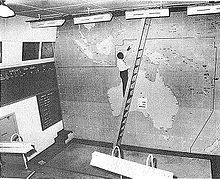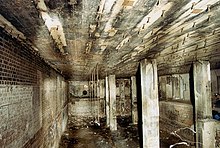Bankstown Bunker

The Bankstown Bunker was a top secret Royal Australian Air Force base that was used during the Second World War. During the war it was Australia's main air defence base. It is no longer in use. The bunker is buried underneath a public park in the suburb of Condell Park in the City of Bankstown, which is in the state of New South Wales, Australia. It is still possible to go into the bunker through a secret passageway.[1][2]
History
[change | change source]



The Bankstown bunker is a three-story building that was mostly underground. It was secretly used during the Second World War by the Australian air force. Builders started to build the bunker in 1942. Workers and volunteers began to work inside the bunker in January 1945. It was called the Sydney "Air Defence Headquarters" and replaced another secret air force base that was in a secret tunnel. This was the Number One Fighter Sector Headquarters underneath St. James train station in Sydney. After that, it was moved to a picture theatre in Bankstown called the Capital Hall.[3] The main job for the people who worked in the bunker, was to track all planes in the eastern area of the South West Pacific. Some of the people who worked in the bunker were from the No.2 Volunteer Air Observer Corps (VOAC), The Women's Auxiliary Australian Air Force and a few members of the Royal Australian Air Force and the United States Army Air Forces. Workers worked in the bunker 24 hours a day seven days a week in shifts called "Flights". The people who worked inside the bunker traveled to work in buses with tinted windows. Everyone that worked in the bunker had to receive special training.
At the end of the war, the bunker was no longer used and people forgot about it. In 1971 it was rediscovered by a reporter who worked for a local newspaper in the area. In 1972 the bunker was set on fire. In 1976 houses were built over part of the building, whilst the main part is underneath a public park.
Inside the bunker
[change | change source]The bunker was built in the same fashion as the underground Operations rooms of wartime England, which planned Britain's air defence fighter plane attacks on the invading German Luftwaffe.
To get inside the bunker you had to enter through a secret passageway which was hidden under a grassy hill. Stairs led to a maze of hallways that lead to different sections. There were two different entrances to get inside the bunker. The two doors were guarded by special police that worked for the military.[4]
The bunker walls were 1.5 metres thick[5] and it was almost bomb proof. It had all the latest equipment of the time to allow it to run as a top secret defence base. It had its own code room, plotting rooms, two escape tunnels, radio transmitter room, kitchen, dining area, bathrooms and bedrooms. In the center of the bunker was a large operations room. This was a large room about two stories high. It was the control centre for all air force missions in the Pacific area. The room also had a big map of the South West Pacific theater of World War II. The bunker also had its own generator, air conditioning and switchboards which directed fifty telephone lines.[6] The telephone lines went to various locations including radar stations and VAOC lookout posts which reported aircraft locations to the bunker.[7] There are rumours of a tunnel running from the bunker to an unknown location.
Location
[change | change source]There is a small park at the end of Taylor Street. In this park, there is a large hill that looks totally out of place. It is under this hill that the bunker has been buried. It is still possible to get in through a secret door.[8]
Other bunkers in Bankstown
[change | change source]There is another bunker in Bankstown. This one is called a "Remote Receiving station" not much is known about its history. It was in Picnic Point National Park, near the South Sydney Power station,[9] People who live in the area say that it is still there. There are many other rumours of bunkers in the Bankstown area, such as under an electricity block house on the corner of Milpera road and Henry Lawson Drive, a demolished bunker under Condell Park High School.
The Bankstown Bunker on TV
[change | change source]The Bankstown Bunker was on a TV show called Burke's Backyard. Don Burke hosted the episode from inside the bunker. To get inside the bunker he used the secret passageway.[source?][10]
References
[change | change source]- ↑ "Bankstown Bunker". www.ozatwar.com.
- ↑ Veitch, Alen (June 24, 1971). "The Bankstown Bunker". Australian Post. pp. 12–13.
- ↑ "No. 1 Fighter Sector Headquarters RAAF, later known as No. 101 FighterControl Unit RAAF". Archived from the original on 2007-09-18. Retrieved 2007-10-08.
- ↑ (information supplied by R. Eyers VAOC worker)
- ↑ http://www.bunkerboyz.org/bankbunk2.htm Archived 2007-08-29 at the Wayback Machine More images and proof of the Bankstown Bunker.
- ↑ Lawrence, Joan; Brian Madden and Lesliie Muir (September 1999). Pictorial History of Canterbury Bankstown. Kingsclear Books. p. 89. ISBN 978-0-908272-55-6.
- ↑ Peters, Merle (January 20, 1993). "Historian's account". Bankstown Torch Newspaper.
- ↑ Harris, Sarah (19 October 1997). "Moves to restore old war rooms". Sunday Telegraph.
- ↑ see map - File:Bankstown01.jpg
- ↑ Video available from Bankstown Library, Local Studies collection, level 3
